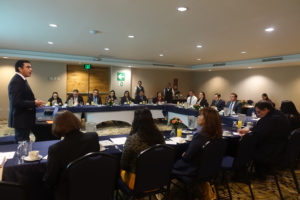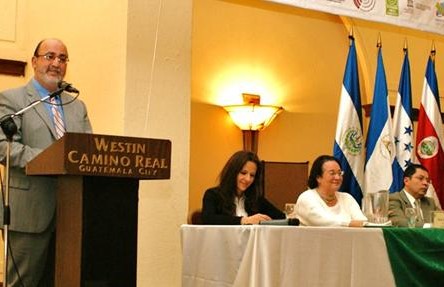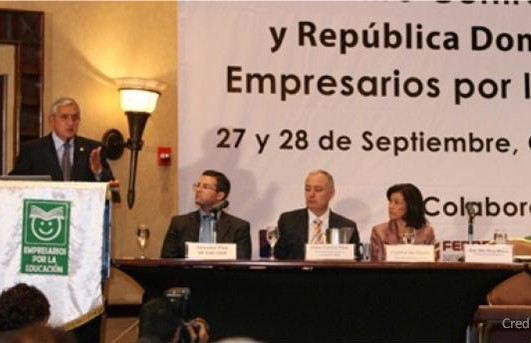PREAL International Conference 2010: Teacher Effectiveness
Summary of PREAL’s recent international conference on teacher effectiveness, held in Guatemala City.

Financial inclusion is key for promoting economic development in Guatemala. Simply stated, the more people that are empowered to use financial products and services,[1] the more investment and productivity there will be on a national level. In Guatemala, access to finance has greatly expanded over the past few years. In fact, from 2011 to 2017, the number of people with accounts at financial institutions doubled. Even so, only 44 percent of the population has an account.[2]
Moreover, a growing gap in financial knowledge threatens to undermine the opportunities provided, because people are being empowered with the access to financial services, but not the knowledge and understanding of how to make smart financial decisions. Managing a bank account, a credit card, or an insurance policy, for example, requires having some basic knowledge of personal finance.
“In many instances, the customers come in and directly ask for the financial educator. The financial educators are the ones who take the time to talk to people, get to know them, and better understand their financial needs” – Remittances Director for the Western Highlands, Banco Industrial
While financial education can be helpful for all sectors of society, it is especially important for Guatemalans who receive remittances. Remittances have a strong potential to reduce poverty, especially when they are properly leveraged for economic development. They are an important force in Guatemala’s economy, representing 11.5 percent of the country’s Gross Domestic Product (GDP).[3] While remittance recipients can and do save, without access to financial institutions and services, much of their savings are kept informally. Moreover, given such informality, their resources are not always well managed.
To respond to these needs, the Opportunities for My Community project provides financial education to help people get the most out of the resources that they have available to them. The project helps transform transactional clients[4] and remittances recipients into bank account holders, bringing their informal savings into the formal financial system. At the same time, the project reinvests resources into credits for the local economy. The project carries out these activities through strategic alliances with two leading banks and one federation of credit unions in Guatemala.
As a part of the project’s financial education strategy, 30 financial educators are distributed among the three partner institutions, Banrural, Banco Industrial and MICOOPE. They are stationed in communities in the Guatemalan Western Highlands and Guatemala City. The team of educators offers personalized financial education sessions, motivating participants to budget, save and acquire financial products according to their needs and personal goals.
“We have noticed something interesting. The people who are advised now have a clear idea of what they want in life, and they’re making plans for the future thanks to what they’ve learned in the financial advising session. I personally know the financial educators that are in the agencies, and they have that gift, that ability to connect with people” – Head of Agencies, Banrural
Along with its financial sector partners, the project also promotes access to credit in these same communities. It works with small and medium enterprises, offering technical support to strengthen their business. At the same time, the banks and the credit unions evaluate the financing requests of these entrepreneurs, determining the eligibility and conditions of credit. Through business coaching and access to credit, the project contributes to strengthening and formalizing the local economy, helping small businesses to grow.
Partnerships have been key to the successes achieved in both financial education and access to credit. To ensure an open line of communication with partners, the project holds frequent meetings with representatives of the financial institutions involved. These meetings serve as a space to share project successes, address any challenges, and discuss lessons learned from the activities carried out jointly. These meetings also serve as an accountability mechanism whereby the project and its private sector partners share responsibility for financial inclusion outcomes.

Likewise, the project has organized workshops for staff of partner institutions to share methodologies and to discuss strategies for promoting financial inclusion in Guatemala. These workshops also serve as an informational platform, providing results of the activities implemented with the partners’ support. Sharing methodologies is a priority for the project, as doing so engages partners, promotes ownership, and strengthens sustainability and learning. These types of activities promote confidence between partners as well as demonstrating that the activities implemented within the project fulfill an important need in Guatemala. They also engage the private sector in transparent, meaningful partnerships to advance financial inclusion in Guatemala.
Summary of PREAL’s recent international conference on teacher effectiveness, held in Guatemala City.
Links to agenda and media coverage of a conference on the state of the teaching profession in Guatemala.
Business and education leaders discuss business sector engagement in education reform in Latin America.


